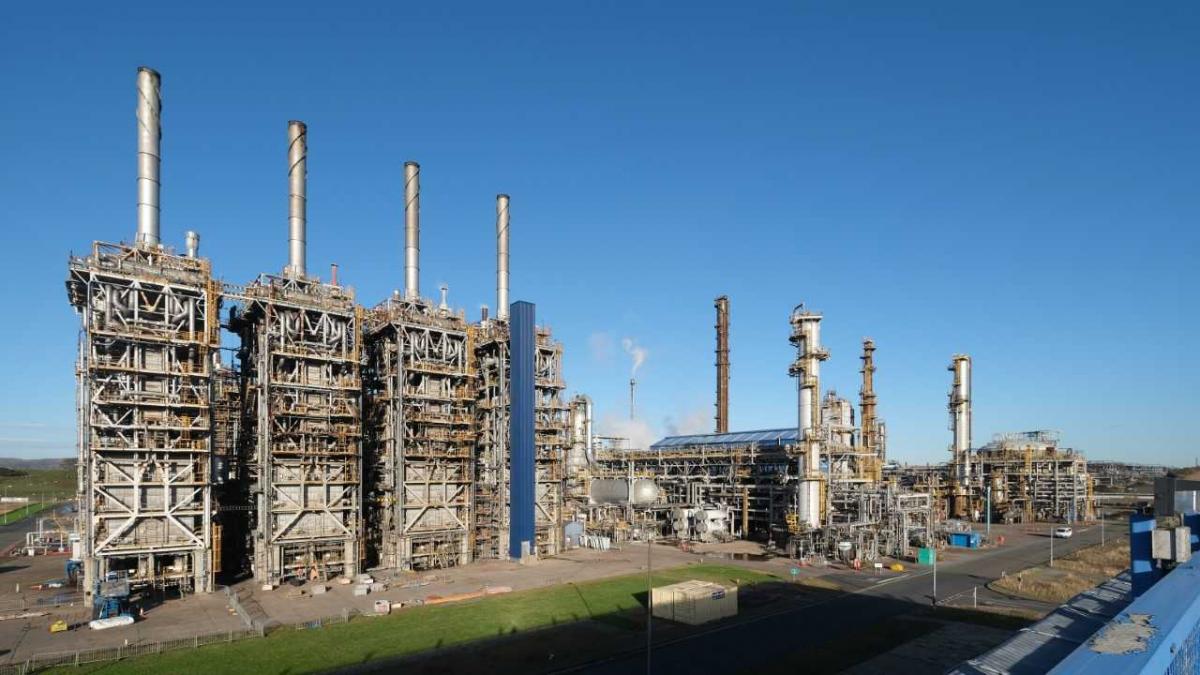ExxonMobil to Shut Down Scotland's Fife Ethylene Plant, Citing Policy Challenges and Market Pressure
- Site
- Fife Ethylene Plant
Fife Ethylene Plant at Mossmorran | Credit: Newsquest
A Strategic Asset's Demise
The Fife Ethylene Plant, which commenced operations in 1985, has been a cornerstone of UK petrochemical production for four decades. Operating around the clock, the facility achieved an annual production capacity of 830,000 tonnes of ethylene through steam cracking of ethane feedstock sourced primarily from North Sea natural gas liquids. The plant supplied approximately half of its ethylene output to UK consumers via the national ethylene pipeline system, with the remainder exported to Europe through the Braefoot Bay marine terminal.
"We considered various options to continue production and tested the market for a potential buyer, but the UK's current economic and policy environment combined with market conditions, high supply costs and plant efficiency do not create a competitive future for the site," ExxonMobil stated in its announcement.
Government Policy Under Fire
ExxonMobil's chairman Paul Greenwood delivered pointed criticism of UK government policies, describing them as "deliberately" undermining the business. Speaking to the BBC, Greenwood identified four critical success factors for petrochemical operations—affordable ethane supply, low-cost operations, competitive market prices, and skilled workforce—asserting that government policy had compromised at least two of these pillars.
"We've had windfall taxes, we've had a ban on production licences—I need cheap sources of abundant ethane and I do not have them, because the North Sea—because of Government policy—is declining rapidly and that ethane is increasingly high price," Greenwood stated. He also cited CO2 taxes and high energy costs as contributing factors to the closure decision.
The criticism echoes broader industry concerns about the UK's competitive position. British industrial energy prices are reportedly 60% higher than those in the European Union and up to 400% higher than in the United States, creating a substantial cost disadvantage for energy-intensive chemical manufacturing.
UK industry minister Chris McDonald acknowledged that government officials had met with ExxonMobil representatives weekly since August to explore options for maintaining operations. However, he indicated that the level of state support required to rescue the plant was "beyond acceptable levels," and noted the "sharp decline in ethane supply in the North Sea" as a contributing factor.
Part of a Broader European Rationalization
The Fife closure is part of an unprecedented wave of capacity rationalization sweeping Europe's petrochemical industry. Since 2024, seven steam crackers have either closed or announced closure plans across the continent, eliminating approximately 4.5 million tonnes per year of ethylene capacity and 2.3 million tonnes of propylene. This represents more than a fifth of Europe's existing ethylene production capacity.
Recent closures include:
- ExxonMobil's 425,000 tonne cracker at Notre-Dame-de-Gravenchon, France (closed Q4 2024)
- Sabic's 865,000 tonne Olefins 6 plant in Wilton, UK (permanently closed, idle since October 2020)
- Dow's planned closure of its 565,000 tonne Böhlen cracker in Germany by 2027
- Versalis (Eni) crackers at Brindisi (440,000 tonnes) and Priolo (530,000 tonnes) in Italy by end-2025
The closures will leave the UK with only one remaining ethylene cracker—Ineos's facility at Grangemouth. However, industry observers have raised concerns about the long-term viability of Grangemouth's petrochemical operations, particularly following the April 2025 closure of the adjacent Petroineos oil refinery.
Structural Challenges Facing the Industry
While ExxonMobil has emphasized policy factors, analysts point to deeper structural challenges confronting European petrochemicals. Europe's chemical industry has contracted by nearly 10% in 2023 alone, with output reaching the lowest level in over a decade. The sector faces multiple headwinds:
Overcapacity and Competition: Massive capacity expansion in Asia and the Middle East has created global oversupply. China's ethylene capacity is projected to reach 87 million tonnes annually by 2030, growing at 6.5% per year, while North America's capacity will increase from 54 million to 58 million tonnes. These newer facilities benefit from scale advantages, more efficient technology, and access to cheaper feedstocks.
Declining Operating Rates: Global ethylene operating rates fell to 84% in 2025, down from over 90% prior to 2019, and are expected to remain in the 84-88% range for the remainder of the decade without significant capacity rationalization.
Energy Prices: Natural gas prices in Europe have been four to five times higher than in the United States in 2024, making cracking operations—which are highly energy-intensive—uneconomical.
Feedstock Challenges: North Sea oil and gas production is forecast to fall by 5.7% in 2025 for crude oil and 9.8% for gas, with production expected to halve between 2021 and 2030. This reduces the availability of ethane feedstock for UK crackers while increasing costs.
ExxonMobil and Shell had previously signed agreements in 2015 with Ineos to supplement North Sea ethane supplies with imports of cheaper US shale gas ethane via Ineos's Grangemouth import terminal. However, these arrangements evidently proved insufficient to maintain the plant's competitiveness.
Government Response and Political Fallout
The UK government stated it "explored every reasonable avenue to support the site" but acknowledged that ExxonMobil faced "significant global challenges," noting that the company had also closed a chemical plant in France. A government spokesperson emphasized that "this is, of course, a commercial decision for the company to take" and pledged support for affected workers through the Department for Work and Pensions' rapid response service and Scotland's Partnership Action for Continuing Employment (PACE) initiative.
Scotland's Deputy First Minister Kate Forbes described the closure as delivering "a very significant blow" to the Scottish economy and urged the Labour government at Westminster to "consider what more they can do for the workers at the plant and take urgent action".
Unite, the union representing many affected workers, has expressed anger at what it views as inadequate government intervention. Derek Thomson, Unite's Scottish secretary, stated that political leaders have "utterly failed" the workforce and warned of potential "electoral backlash".
The closure has also intensified political debates over net-zero climate policies, with some politicians arguing that climate targets directly caused the closure. Reform UK's Nigel Farage claimed climate policy was "destroying vital national assets" like Grangemouth. However, energy analysts have countered that the hydrocracker failure at the Grangemouth refinery and long-term market conditions were more significant factors than climate policy alone.
Future Outlook
ExxonMobil has indicated that approximately 50 employees may have the opportunity to transfer to the company's Fawley Petrochemical Complex in Hampshire, nearly 500 miles away in southern England. However, this represents only a fraction of the affected workforce.
The closure further reduces the UK's domestic petrochemical production capacity at a time when the country has become increasingly reliant on energy and chemical imports. Following the closure of the Coryton refinery in 2013, Grangemouth in April 2025, and Lindsey refinery in July 2025, the UK now has only four major oil refineries remaining. With the Fife Ethylene Plant's closure, UK ethylene production capacity will be concentrated in a single facility at Grangemouth.
Industry analysts warn that additional European crackers remain at risk with estimates that up to 5 million tonnes of ethylene capacity in Europe could be phased out over the next five years, with a further 13% of total capacity currently up for sale. Shell and Sabic have indicated intentions to continue reassessing and potentially optimizing their European portfolios amid persistently weak demand and elevated costs.
The one bright spot on the European petrochemical horizon is Ineos's €4 billion Project One, a 1.45 million tonne per year ethane cracker under construction at Antwerp, Belgium, which is expected to come online in late 2026 or early 2027. It will be the first new cracker in Europe in years and will utilize ethane from Qatar's North Field expansion.
Conclusion
The closure of ExxonMobil's Fife Ethylene Plant represents more than the end of a single facility—it symbolizes the accelerating deindustrialization of UK chemical manufacturing. As ExxonMobil stated, "FEP has been a cornerstone of chemical production in the UK for 40 years, and its closure reflects the challenges of operating in a policy environment that is accelerating the exit of vital industries, domestic manufacturing, and the high-value jobs they provide".
Whether through policy reform, energy cost reduction, or new investment models, reversing the decline of UK petrochemicals will require coordinated action from government, industry, and labor stakeholders. For the workers and communities of Fife, however, such changes come too late to save the plant that has been central to the local economy for four decades.
The final shutdown is scheduled for February 2026, pending completion of employee consultations.
Note: Operations at Shell's Fife Natural Gas Liquids (NGL) plant adjacent to the ethylene facility and at the St Fergus gas terminal are expected to continue unaffected by the closure.
Sources: This article was compiled from official announcements by ExxonMobil Chemical Limited and UK government statements, supplemented by reporting from the Financial Times, BBC News, Sky News, Reuters, The Telegraph, The Independent, and industry publications including Chemical & Engineering News, ICIS Chemical Business, ChemWeek, and Oil & Gas Journal. Technical specifications and environmental data were verified through ExxonMobil's UK operations website, Scottish Environment Protection Agency (SEPA) filings, and Companies House records. Market analysis data on European petrochemical capacity rationalization and global ethylene trends were sourced from Wood Mackenzie, S&P Global Commodity Insights, Argus Media, and the UK Chemical Industries Association.







